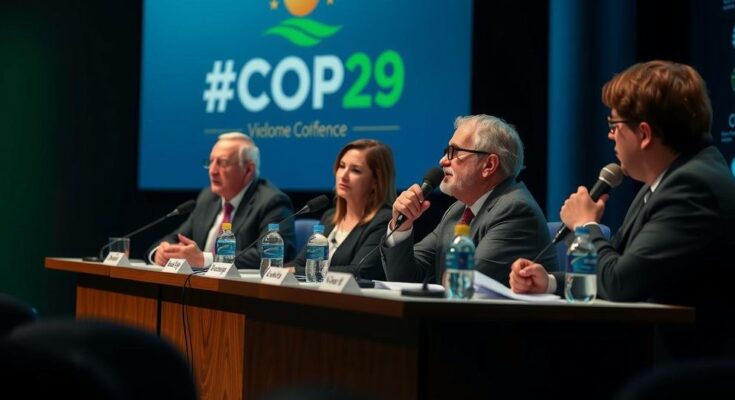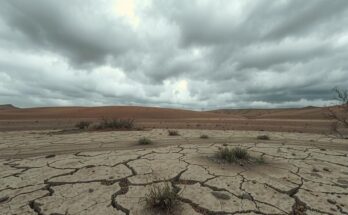During COP29 in Baku, leaders clashed over climate strategies as a critical report revealed that carbon emissions from fossil fuels reached unprecedented levels. To meet the Paris Agreement’s goals, net-zero CO2 emissions are now necessary by the late 2030s. Calls for urgent action contrasted with arguments for continued reliance on fossil fuels, and discussions on financial support for developing nations remain contentious.
Global leaders presented divergent strategies for addressing climate change during the recent UN-led COP29 talks in Baku, Azerbaijan. A significant report from the Global Carbon Project indicated that carbon dioxide emissions from fossil fuels have reached historic highs, necessitating an accelerated timeline for achieving carbon neutrality. To adhere to the Paris Agreement’s goal of capping warming at 1.5 degrees Celsius, net-zero CO2 emissions must be reached by the late 2030s, a shift from the previous deadline of 2050. During the discussions, Azerbaijan’s lead negotiator, Yalchin Rafiyev, emphasized the urgency for immediate action, stating, “The time window is narrowing, shrinking — and we need to act urgently.” Leaders from climate-affected nations voiced their alarm over the prospective rollback of climate commitments, especially with political changes such as the election of Donald Trump in the United States. While several leaders defended the continued use of fossil fuels, representatives from nations severely impacted by climate change made passionate pleas for swift and definitive action against fossil fuel dependence. Notably, Albanian Prime Minister Edi Rama criticized inaction and the absence of numerous leaders from the summit. In contrast, Italian Prime Minister Giorgia Meloni advocated for a balanced approach that does not sacrifice economic stability for rapid decarbonization. Amid negotiations for climate finance, developing countries are advocating for significant financial support, asserting that affluent nations must increase their contributions significantly, yet many donors remain hesitant to commit to new public funding. As discussions progressed, fresh proposals for climate finance were introduced, though long-standing disagreements remained unresolved. The dire need for equitable financial solutions was echoed by Bahamian Prime Minister Philip Davis, highlighting an imbalance where small island nations invest vastly more in debt repayments than they receive in climate aid. Ultimately, the COP29 summit underscored the chasm between those calling for immediate fossil fuel phase-out and leaders advocating for a gradual transition, with pressing negotiations ahead concerning funding strategies to support vulnerable nations as they confront climate challenges.
The COP29 meetings are critical discussions held under the UN framework, intended to galvanize global action toward climate change mitigation. Reports such as those from the Global Carbon Project provide essential data on current emissions trends and outline necessary paths for achieving emissions targets, amplifying the need for urgent policy responses. The divide among nations regarding fossil fuel reliance and climate financing is particularly stark, often reflecting broader economic interests and vulnerabilities experienced by developing nations due to climate-related impacts. The ongoing discourse highlights the complexity of balancing economic stability with environmental sustainability.
The developments from COP29 reveal a crucial juncture in international climate negotiations, underscoring the urgency for action against rising emissions amidst political divides. With leaders expressing varying degrees of commitment to climate action, the outcome of discussions surrounding climate finance will be pivotal in shaping future strategies. The responsibility lies on wealthier nations to fulfill their obligations and assist those most affected by climate change, ensuring that a collective approach can be maintained toward achieving global emissions targets.
Original Source: www.rfi.fr




